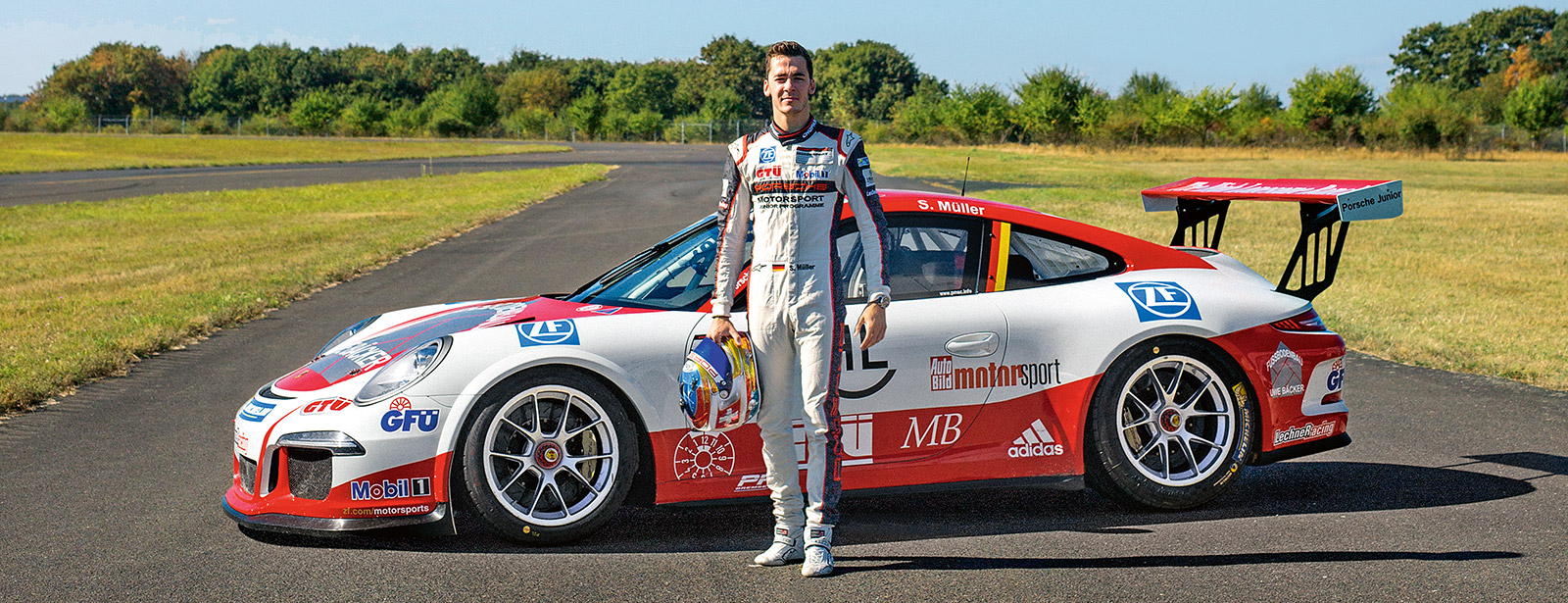
Brainwork
The path to victory begins upstairs. Sven Müller had to wait six years for his great triumph in Formula racing. To win, he first had to lose his fear of losing.
Clouds settle over the Circuit of the Americas in Austin, Texas. It’s around 24 degrees Celsius in the shade, 40 in the car. In less than an hour, twenty-seven drivers from fourteen countries will test their mettle on the track. One of them will take home overall victory in the
Before the race, Müller was focused. In the past, he would never step into the car without playing his current favorite song—a ritual of sorts. Now, he’s discontinued the practice. He centers himself to prepare for a perfect start. Over the past few months, he has driven the 5.516-kilometer circuit in Austin time and again: a few times in his 460-hp
The next day, Müller is a bit sore, though not nearly as much as three years ago after his first laps on the Nürburgring. “Back then I was so wound up that I sat completely wrong in the car, and after ten laps I was in unbelievable pain.” He chuckles at the words “back then.” On the other hand, if you drive your first go-kart at the age of six, race for a European championship at the age of twelve, join the ADAC Formel Masters before the age of nineteen, and then move on to Formula 3, it’s no stretch to talk about “back then.”
![[+]](https://files.porsche.com/filestore/image/multimedia/none/christophorus-issue380-article08-content-01/normal/20ba7dc7-e7ad-11e6-8503-0019999cd470/porsche-normal.jpg)
Focus
Müller was part of the
The pursuit
If he’d never learned to lose, he wouldn’t be able to win today—of that, Müller has no doubt. It was his drive that first brought him to
Müller was scarcely a shooting star. He had to wait six long years for his two championship titles in Formula racing. Six years during which he stopped dreaming of Formula 1 and came to feel more and more at home in GT racing. “I had some low points, but I also learned to just keep attacking,” he says.
Strength
The new Müller is a winner because he’s physically and mentally fit, and because he knows that a race is primarily won not on the track, but in the mind. Nothing can distract the driver and no error can derail him. Weaknesses must be converted into strengths. “I call my mental coach before and after the races. He always finds the words that build me up and help me focus.”
Even in his first year as a
Time off
“Fishing is my nicest hobby,” says the son of a Swiss mother and German father who likes to visit his grandfather in the French-speaking part of Switzerland. Grand-père started taking him to the lake as a four-year-old. Müller speaks of him just as lovingly as he does of his mother, Anouk, his father, Michael (a former twenty-four-hour race-car driver), and his younger brother, Benedikt. Müller owes not only his perfect French to his grandfather, but also his love of nature and the ability to enjoy silence. “I enjoy sitting on the water and fishing. For me, there’s nothing finer.” His brown eyes light up as he speaks of “pleasure”—not “killing time.” He speaks of “staying grounded,” not “soaring.” Of calmness and patience. And perhaps it is precisely these qualities that make a winner: not letting losses knock you down and keeping your feet on the ground when you win. Just punch that fist in the air with joy and keep fighting when the next race comes around.
By Christina Rahmes
Photos by Theodor Barth
Developing young talents at Porsche
Since 1997,
Module 1: Each season,
Module 2: The most successful drivers in the international
![[+]](https://files.porsche.com/filestore/image/multimedia/none/christophorus-issue380-article08-margin-01/normal/289d0bc5-e7ad-11e6-8503-0019999cd470/porsche-normal.jpg)